Ap biology photosynthesis - Study guides, Class notes & Summaries
Looking for the best study guides, study notes and summaries about Ap biology photosynthesis? On this page you'll find 145 study documents about Ap biology photosynthesis.
Page 2 out of 145 results
Sort by
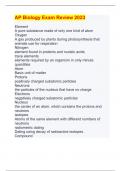
-
AP Biology Exam Review 2023
- Exam (elaborations) • 45 pages • 2024
- Available in package deal
-
- $12.99
- + learn more
AP Biology Exam Review 2023 Element A pure substance made of only one kind of atom Oxygen A gas produced by plants during photosynthesis that animals use for respiration Nitrogen element found in proteins and nucleic acids trace elements elements required by an organism in only minute quantities Atom Basic unit of matter Protons positively charged subatomic particles Neutrons
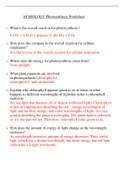
-
AP BIOLOGY Photosynthesis Worksheet
- Exam (elaborations) • 4 pages • 2023
-
- $15.99
- + learn more
AP BIOLOGY Photosynthesis Worksheet1. What is the overall reaction for photosynthesis? 6 CO2 + 6 H2O glucose (C6H12O6) + 6 O2 2. How does this compare to the overall reaction for cellular respiration? It is the reverse of the overall reaction for cellular respiration. 3. Where does the energy for photosynthesis come from? from sunlight 4. What plant pigments are involved in photosynthesis? chlorophyll a, chlorophyll b, and carotenoids 5. Explain why chlorophyll appears green to us ...
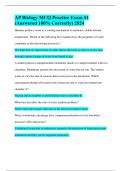
-
AP Biology MCQ Practice Exam #1 (Answered 100% Correctly) 2024
- Exam (elaborations) • 12 pages • 2024
-
Available in package deal
-
- $16.49
- + learn more
AP Biology MCQ Practice Exam #1 (Answered 100% Correctly) 2024 Humans produce sweat as a cooling mechanism to maintain a stable internal temperature. Which of the following best expalins how the properties of water contribute to this physiological process? The high heat of vaporization of water allows the body to remove excess heat through a phase change of water from liquid to gas. A student placed a semipermeable membrane inside a U-shaped channel with two chambers. Membrane permits...
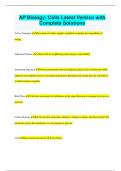
-
AP Biology: Cells Latest Version with Complete Solutions
- Exam (elaborations) • 9 pages • 2024
- Available in package deal
-
- $8.99
- + learn more
AP Biology: Cells Latest Version with Complete Solutions Active Transport Movement of solutes against a gradient, requiring the expenditure of energy Adhesion Proteins Attach cells to neighboring cells and give cell stability Anchoring Junctions Protein attachments between adjacent animal cells; desmosomes bind adjacent cells together and are associated with protein filaments that extend into the cell interior to hold structures together Bulk Flow Collective movement of substan...
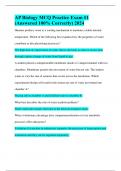
-
AP Biology MCQ Practice Exam #1 (Answered 100% Correctly) 2024
- Exam (elaborations) • 12 pages • 2024
-
Available in package deal
-
- $14.49
- + learn more
AP Biology MCQ Practice Exam #1 (Answered 100% Correctly) 2024 Humans produce sweat as a cooling mechanism to maintain a stable internal temperature. Which of the following best expalins how the properties of water contribute to this physiological process? The high heat of vaporization of water allows the body to remove excess heat through a phase change of water from liquid to gas. A student placed a semipermeable membrane inside a U-shaped channel with two chambers. Membrane permits...
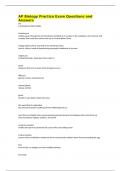
-
AP Biology Practice Exam Questions and Answers
- Exam (elaborations) • 5 pages • 2024
-
- $10.39
- + learn more
AP Biology Practice Exam Questions and Answers yes is testosterone lipid soluble testosterone readily passes through the cell membrane and binds to a receptor in the cytoplasm. the hormone and receptor then enter the nucleus and act as a transcription factot voltage-gated calcium channels in the membrane open what is a direct result of depolarizing presynaptic membrane of an axon oxygen gas in photosynthesis, atom goes from water to pump whenever this term is used, acti...
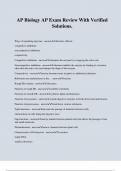
-
AP Biology AP Exam Review With Verified Solutions.
- Exam (elaborations) • 7 pages • 2024
- Available in package deal
-
- $11.49
- + learn more
AP Biology AP Exam Review With Verified Solutions. Ways of regulating enzymes - answerallosteric effector competitive inhibition noncompetitive inhibition cooperativity Competitive inhibition - answersubstance the enzyme by occupying the active site Noncompetitive inhibition - answersubstance inhibits the enzyme by binding to a location other than the active site and changes the shape of the enzyme Cooperativity - answerenzyme becomes more receptive to additional substrates Ribosomes a...
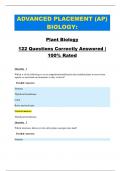
-
ADVANCED PLACEMENT (AP) BIOLOGY: Plant Biology 122 Questions Correctly Answered | 100% Rated
- Exam (elaborations) • 52 pages • 2023
-
Available in package deal
-
- $12.00
- + learn more
ADVANCED PLACEMENT (AP) BIOLOGY: Plant Biology 122 Questions Correctly Answered | 100% Rated Question 1 Which is of the following is not an adaptation/modification that enabled plants to move from aquatic to terrestrial environments as they evolved? Possible Answers: Stomata Thylakoid membranes Cutin Roots and root hairs Correct answer: Thylakoid membranes Question 2 Which structures did not evolve after plants emerged onto land? Possible Answers: Stomata Seeds Cell wal...
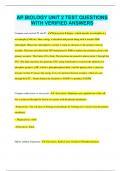
-
AP BIOLOGY UNIT 2 TEST QUESTIONS WITH VERIFIED ANSWERS
- Exam (elaborations) • 18 pages • 2024
- Available in package deal
-
- $9.99
- + learn more
AP BIOLOGY UNIT 2 TEST QUESTIONS WITH VERIFIED ANSWERS Compare and contrast P2 and P1. Photosystem II begins , which absorbs wavelengths at a wavelength of 680 nm. Here, energy is absorbed and passed along until it reaches P680 chlorophyll. When this chlorophyll is excited, it sends its electrons to the primary electron acceptor. Electrons are taken from H2O and passed to P680 to replace the electrons given to the primary acceptor. This forces O2 to form. The electrons are passed to ph...
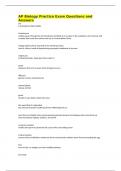
-
AP Biology Practice Exam Questions and Answers
- Exam (elaborations) • 5 pages • 2024
- Available in package deal
-
- $9.59
- + learn more
AP Biology Practice Exam Questions and Answers yes is testosterone lipid soluble testosterone readily passes through the cell membrane and binds to a receptor in the cytoplasm. the hormone and receptor then enter the nucleus and act as a transcription factot voltage-gated calcium channels in the membrane open what is a direct result of depolarizing presynaptic membrane of an axon oxygen gas in photosynthesis, atom goes from water to pump whenever this term is used, acti...

Do you wonder why so many students wear nice clothes, have money to spare and enjoy tons of free time? Well, they sell on Stuvia! Imagine your study notes being downloaded a dozen times for $15 each. Every. Single. Day. Discover all about earning on Stuvia


